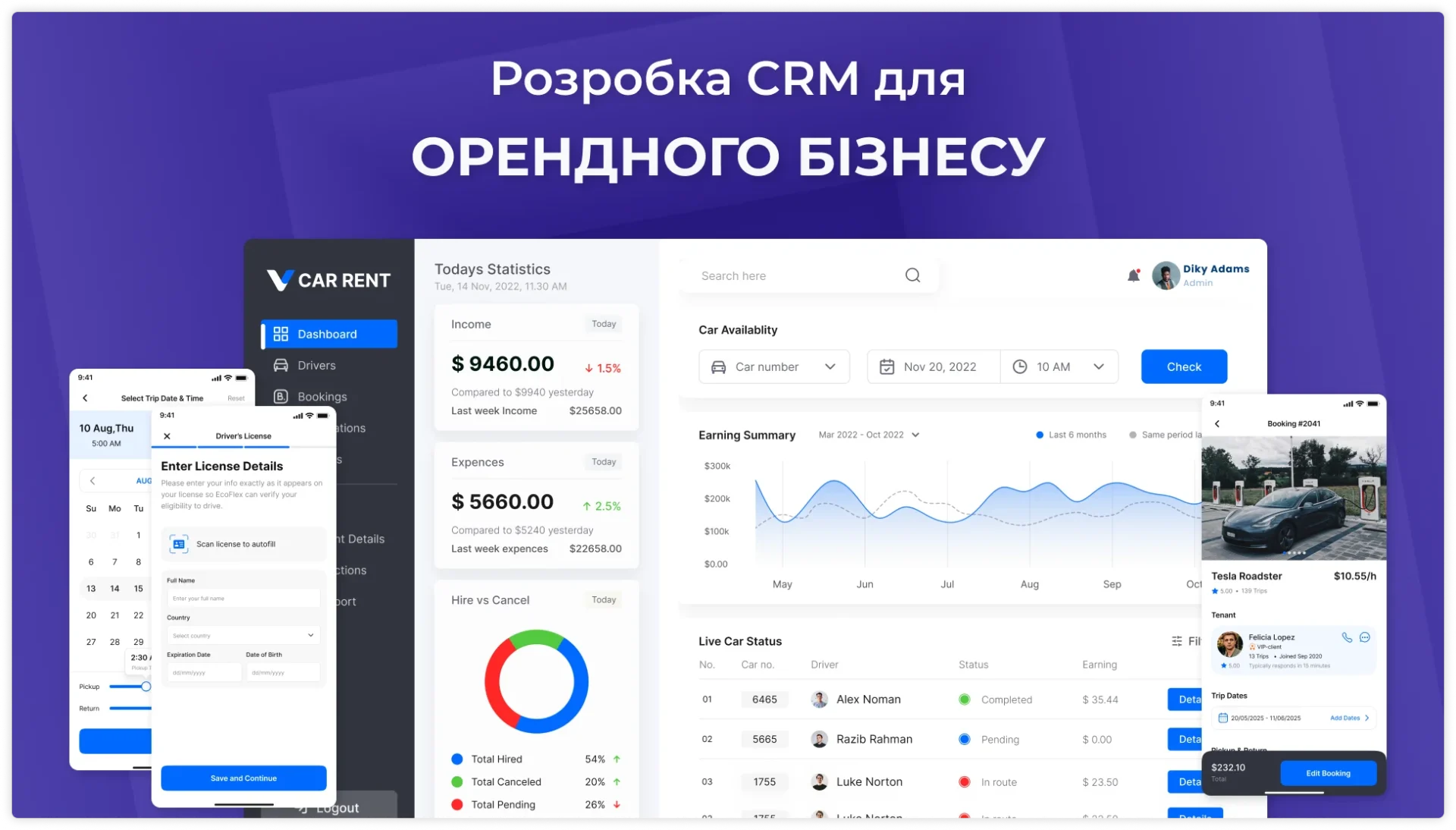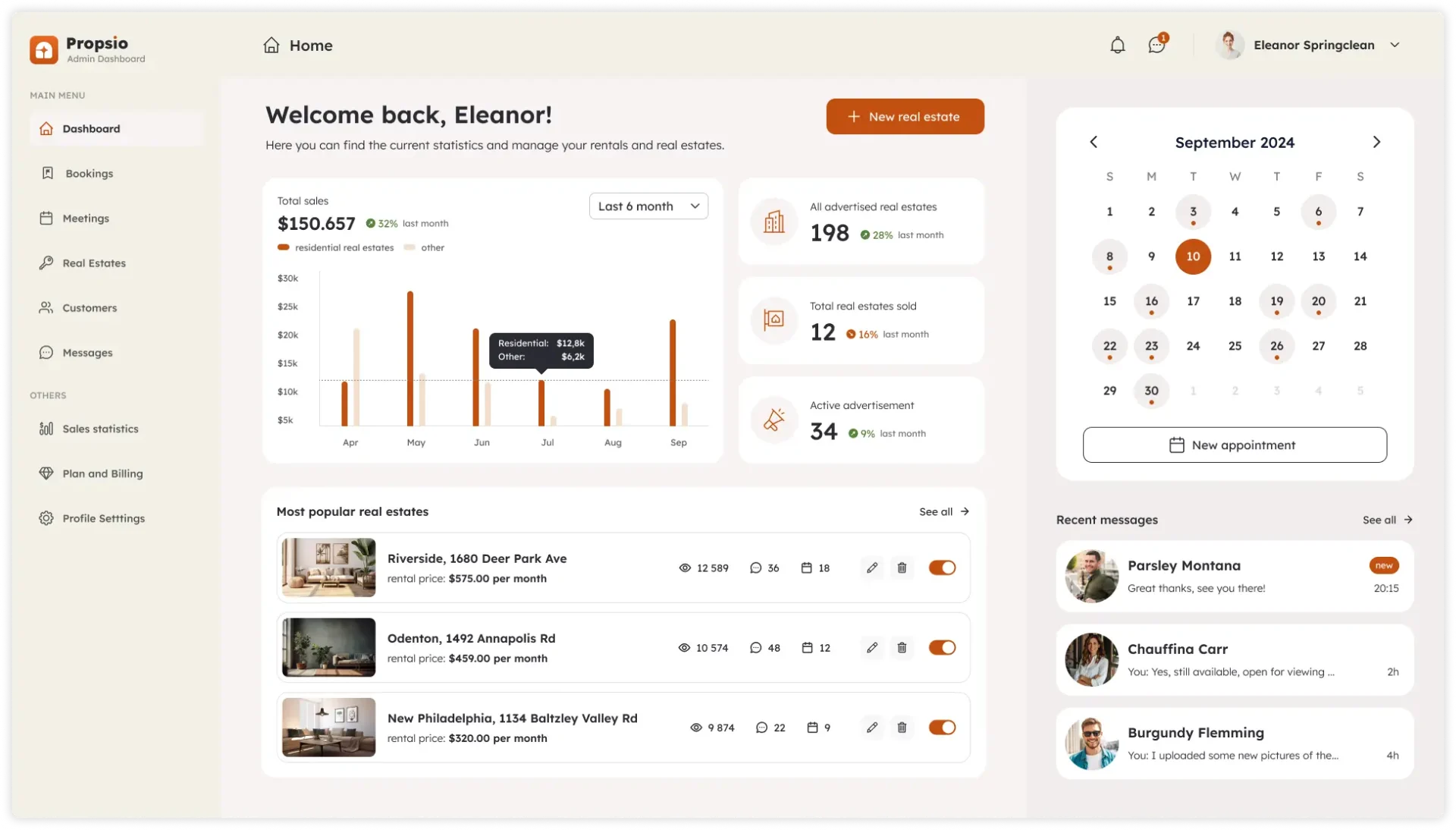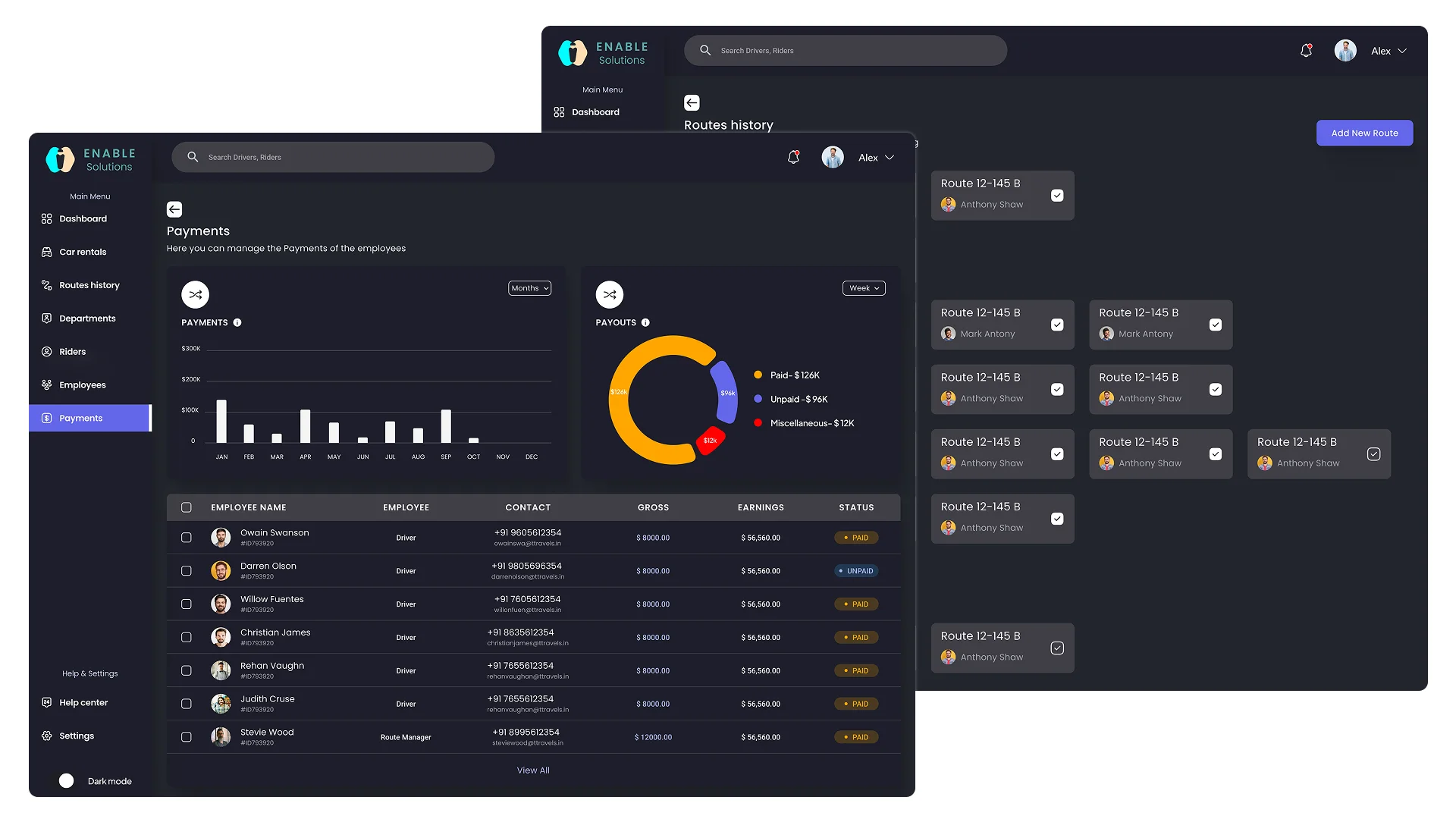
The efficiency of the rental business is determined by the speed of processing requests, payment control, and the level of customer service. You can control this manually, but it is expensive, slow and does not contribute to growth in any way. A CRM system for renting is a comprehensive solution that automates key business processes: booking, invoicing, customer management, and financial flow control. Regardless of whether you manage real estate for rent, car rental or equipment rental, a specialized CRM system for the rental business will make it more efficient and take it to the next level.
A rental CRM program is a comprehensive platform that automates and optimizes all aspects of rental business management: from accounting for clients and rental objects to data analysis and launching marketing campaigns. It allows you to store and organize information in one place, improve communication with customers and the productivity of your team.
Unlike ready-made software solutions, development from scratch allows you to get individual software – for example, CRM for car rental, CRM for daily apartment rental, or CRM for renting special equipment.

The rental business seems simple from the outside: the client leaves an application, makes an advance payment, receives the property for use and returns it on time. But in reality, landlords face a lot of hidden problems that slow down work, reduce profits and complicate growth.
If you have only a few cars or three apartments for rent and a small flow of customers, it is quite possible to manage the rental manually. But if the business grows, applications come from different channels, and the property is lost, it’s time to automate with the help of an individual rental program.
A CRM system for rent should have functionality that covers all aspects of the business. The main features include the following:
CRM for a car rental company
A modern rental business is more than renting out property for temporary use. This is a complex system of interaction with customers, payment accounting, logistics, asset maintenance, and analytics. CRM for rent and rental helps to solve many problems in this business, depending on the specifics of the rented objects.
Automation of real estate rental simplifies the management of daily, long-term and commercial facilities:
Automation of daily apartment rental reduces the time spent on frequent check-ins and outings, as well as simplifies communication with guests: it automatically confirms the reservation of the facility and accepts payment.
Car rental automation is an opportunity to effectively manage the fleet, rental agreements, and vehicle maintenance. CRM for car rental performs the following tasks:
Automation of equipment rental prevents losses and simplifies document flow. Equipment rental program:
Leasing automation makes it easier to manage contracts, payments, and legal documents, and allows you to analyze the profitability of transactions. With CRM, you can:
The use of a CRM system allows you to significantly increase the efficiency of the rental business, reduce operating costs, improve the quality of customer service and increase profits.

Automation of rental accounting is becoming more and more in demand among various categories of businesses. The greatest benefit from CRM is received by:
If you recognize at least one of these problems, it’s time to think about implementing CRM for your rental business.
A custom CRM for a rental business is more than just a customer accounting system. It will become your smart assistant that takes on important tasks, optimizes business processes, automates routine tasks, allowing you to focus on strategic development.
Thanks to the rental business program, owners can not only minimize the human factor, but also scale their business quickly and painlessly.
To create an effective, convenient, reliable software product, you need a team of specialists in various areas:
Ready-made CRM systems can cover the basic tasks of the rental business, but they often do not take into account all its features. Individual CRM development allows you to create a solution that is fully adapted to business processes, the type of leased property, and the requirements of the company. They have the following advantages:
If the business is developing rapidly, there are specific requirements for rental accounting, complex business processes, and increased requirements for data protection, you do not need universal software, but an individual flexible system without restrictions.
CRM screens for apartment rentals
Automation of a car rental point or real estate rental business is carried out in several stages and requires a professional and consistent approach.
At the initial stage, specialists delve into the specifics of your business, analyzing first of all:
Identify the main “pain points” of the business. For example, how to speed up the processing of rental applications, or how to reduce the number of late payments. They also identify key business processes that need automation and formulate functional requirements for the future CRM system for rent.
The terms of reference are a document that clearly describes what a CRM system for a rental business should be: what tasks to solve, what processes to automate, and what business indicators should improve after its implementation. This reduces the risks of misunderstandings between the customer and developers, and also helps to avoid expensive improvements in the future.
The technical specifications describe the functional requirements:
Before developing a system, it is important to carefully design its logic and architecture. At this stage, they determine how users will interact with the system – from logging in to performing key operations:
Then a prototype of the system is created, which allows you to demonstrate the functionality of the future product to the customer and make the necessary adjustments. The interface should be user-friendly so that they can quickly find the information they need, process applications, and perform operations. Modern tools are used to create prototypes: Moqups, Figma, Sketch, Adobe XD. This stage helps to avoid unnecessary adjustments in the future, ensuring high quality development.
At the UX/UI design stage, designers create an interface that makes working in CRM for rent convenient, and the rental process is quick and clear. The design should correspond to the brand identity, be intuitive and adaptable for different devices.
UX designers are engaged in the development of the structure of pages, buttons, input fields, filters and navigation, the development of a user-friendly interface for mobile users, and the optimization of controls for touch screens.
UI design includes everything related to the exterior design:
This stage covers the direct writing of the code and the implementation of all the functionality defined in the terms of reference. Both the client (frontend) and server (backend) parts of the CRM system for rent are being developed, the approved design and integration with other business systems via API are implemented. The frontend is developed using modern frameworks and libraries such as React, Angular, Vue.js. For the backend, they use programming languages – Python, Java, Node.js, PHP and databases – PostgreSQL, MySQL, MongoDB.
Comprehensive testing of the system is a mandatory step necessary to identify and eliminate errors in the operation of the system. Before implementation, it is important to check not only functionality, but also security, stability of work under load, as well as interaction with other business systems. For testing, tools such as Selenium, JUnit, TestRail are used.
After successful completion of testing, the CRM system is deployed on the client’s server or in a cloud environment (AWS, Azure, Google Cloud), data from existing systems is transferred and new software is implemented in the production environment. To avoid interruptions in work, the implementation of a CRM system for rent is carried out in stages. Staff training is mandatory so that each user can work effectively with the system. For this purpose, training sessions are held, instructions and video lessons are created.
After launch, the CRM system requires constant maintenance, optimization, and refinement. In the first months after launch, active monitoring of the system is carried out, user feedback on possible problems is analyzed. Regular updates are aimed at improving the stability of CRM operation and data processing speed, updating security mechanisms and adapting to new legal requirements. As the business grows, additional integrations, new automation modules, and advanced analytics capabilities may be required.
CRM support and development is a process that never stops. Business evolves, new technologies appear, customer needs change, and the system must respond to these changes.
CRM system interfaces for professional cameras renting
Before ordering the development of a CRM for rent, business owners usually think about problems such as:
Any technological solution is associated with risks. But with a professional approach to development and implementation, a custom management system brings only benefits, and possible risks can be controlled. The main thing is to choose a reliable and experienced team, correctly formulate automation goals.
Now the success of the rental business is determined by speed and personalization, so it needs tools that allow you not only to keep up with trends, but also to stay ahead of them. Our specialists understand the specifics of this area and have experience in developing management systems of various types, including CRM for equipment rental, CRM for car rental, and CRM for commercial real estate rental.
We guarantee an innovative approach, efficiency and compliance with modern market requirements. Automation of vehicle rental or real estate rental with AVADA MEDIA is not just the development of a management system, but the implementation of a strategic tool that helps to turn every contact into a loyal customer, and each operation into an optimized process.
Is it possible to integrate CRM for rental and rental with external booking platforms?
Yes, through the API, you can integrate the system with popular booking platforms (Booking, Airbnb, Rentcars). This will allow you to automatically synchronize property availability, prices, and reservations in real time.
Can you use a CRM to manage multiple rental properties at once?
You can manage various objects (hotels, apartments, cars, equipment) from a single interface, having convenient access to all data.
Can I manage CRM for rental through a mobile app?
Yes, you can develop a mobile version of CRM or integrate a web application with mobile access to manage your business in real time.
How long does it take to develop a CRM for a rental property?
The duration of the development of any control system depends on the complexity of the functionality, the number of integrations and users. It usually takes from 3 months.
Can a rental business program support multicurrency?
Yes, and this will allow you to make transactions with customers from different countries and keep records in different currencies.
Can you set up different access levels for employees?
In an individual CRM system for renting, you can differentiate access rights: administrators will manage finances and analytics, managers will work with customers and bookings, and technical staff will monitor property maintenance.
How does the program prevent fraud and non-return of property?
The system records customer data, keeps a record of collateral and warns of risks based on the rental history. You can also integrate document verification and credit history functions.
Does CRM have dynamic pricing?
Yes, you can set up a dynamic change in prices depending on the season, demand, lease term or special shares, and thus flexibly manage profitability.
Is it possible to control the condition of the property and keep a history of repairs?
Yes, CRM helps to keep track of the technical condition of objects, fix breakdowns, make service requests and automatically remind you of scheduled maintenance.
How does CRM simplify the legal execution of transactions?
The system can automatically generate lease agreements, acceptance certificates, invoices and other documents, as well as store them in digital form.
Our works
Contact the experts Have a question?
Developed by AVADA-MEDIA™
The user, filling out an application on the website https://avada-media.ua/ (hereinafter referred to as the Site), agrees to the terms of this Consent for the processing of personal data (hereinafter referred to as the Consent) in accordance with the Law of Ukraine “On the collection of personal data”. Acceptance of the offer of the Consent is the sending of an application from the Site or an order from the Operator by telephone of the Site.
The user gives his consent to the processing of his personal data with the following conditions:
1. This Consent is given to the processing of personal data both without and using automation tools.
2. Consent applies to the following information: name, phone, email.
3. Consent to the processing of personal data is given in order to provide the User with an answer to the application, further conclude and fulfill obligations under the contracts, provide customer support, inform about services that, in the opinion of the Operator, may be of interest to the User, conduct surveys and market research.
4. The User grants the Operator the right to carry out the following actions (operations) with personal data: collection, recording, systematization, accumulation, storage, clarification (updating, changing), use, depersonalization, blocking, deletion and destruction, transfer to third parties, with the consent of the subject of personal data and compliance with measures to protect personal data from unauthorized access.
5. Personal data is processed by the Operator until all necessary procedures are completed. Also, processing can be stopped at the request of the User by e-mail: info@avada-media.com.ua
6. The User confirms that by giving Consent, he acts freely, by his will and in his interest.
7. This Consent is valid indefinitely until the termination of the processing of personal data for the reasons specified in clause 5 of this document.
Send CV
Contact us in any convenient way for you:
+ 38 (097) 036 29 32